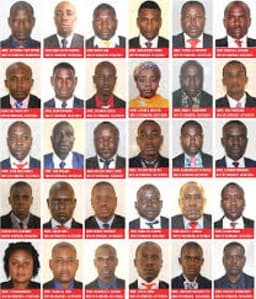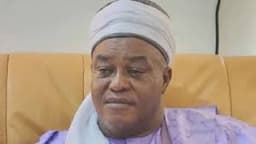


























NEWS EXPRESS is Nigeria’s leading online newspaper. Published by Africa’s international award-winning journalist, Mr. Isaac Umunna, NEWS EXPRESS is Nigeria’s first truly professional online daily newspaper. It is published from Lagos, Nigeria’s economic and media hub, and has a provision for occasional special print editions. Thanks to our vast network of sources and dedicated team of professional journalists and contributors spread across Nigeria and overseas, NEWS EXPRESS has become synonymous with newsbreaks and exclusive stories from around the world.

Before beginning his academic career at the University of Ilorin, AbdQuadri Oluwasegun had diligently prepared. In anticipation of his resumption, the first-year art student made the difficult decision to quit his job as an Arabic teacher at a private school in Sango Ota, prioritising his education above all else.
But barely days after the academic session was set to begin, the announcement of a nationwide ASUU strike brought his plans to an immediate halt.
“I made major personal sacrifices in preparation for the new academic session, only to be met with an unplanned strike,” Oluwasegun told The Guardian Nigeria.
“I quit my job as an Arabic teacher in a private school around Sango Ota to prepare solely for my institution resumption.
“I have been there teaching students for over a year, and the pay has been financially helping my livelihood.”
He had taught there for over a year, earning just enough to stay afloat financially. He even turned down several freelance graphic design jobs to prepare for the academic calendar ahead.
Oluwasegun told The Guardian Nigeria that he had pictured himself exploring his potential, meeting new people, and strolling around the university grounds. But instead, he is back home, idle, uncertain, and frustrated.
Oluwasegun is one of millions of students affected by the latest industrial action declared by the Academic Staff Union of Universities (ASUU), which began a two-week warning strike on Sunday, October 13.
The action, described by the union as “total and comprehensive”, has led to the shutdown of academic activities across multiple public universities in the country.
ASUU says the strike is in response to the Federal Government’s alleged failure to implement the 2009 ASUU-FGN Agreement.
The union is demanding the renegotiation of conditions of service, the release of revitalisation funds for public universities, the settlement of earned academic allowances, promotion arrears, salary backlogs, and an end to what it calls the victimisation of its members in some institutions.
But the Federal Government says it is invoking its ‘No Work, No Pay’ policy against ASUU to protest unmet demands by the Federal Government.
Minister of Education, Dr Tunji Alausa, said that the Federal Government has met almost all the demands of the union but argued that the lecturers were not interested in keeping the students in class despite the efforts of the Federal Government.
For Oladapo Aishat, a final-year student of Arabic and Islamic Studies at the University of Ibadan, the strike has placed a hard stop on her academic project and her plans for the future.
Aishat said, “With the strike, I could no longer continue my project, which is likely to affect me when exams begin because of a likely clash with other important activities. The constant instability makes future planning difficult and reduces confidence.”
Stories like these are spreading across the nation. Once again, students who had just returned or were about to return to school are faced with the prospect of wasted time and missed opportunities. Students must deal with the fallout even though ASUU calls the strike ‘total and comprehensive’.
At the Federal University of Agriculture, Abeokuta, Shakirat Usman, a third-year Microbiology student, recalled how a practical session was cut short as striking lecturers paraded the campus.
Usman explained that this week should have marked the sixth week of lectures; however, the strike has frozen the calendar indefinitely.
“The delay in academic activities aligns with a recurrent pattern observable in Nigerian universities whenever such strikes occur. When the strike eventually ends, there is always a rush in academic activities which is not favourable to we the students academically,” she lamented.
At Obafemi Awolowo University in Ile-Ife, 100-level student Temi, still fresh from secondary school, said she had spent weeks daydreaming about her new university life. It was her first semester, a milestone moment she had looked forward to for years.
“I was so excited to start university — meeting new people, exploring the campus, and learning from lecturers. Now, I’m just at home, waiting for the strike to end.”
The strike has cost many first-year students more than just time; it has cost them the early experiences that ought to signal the start of a new chapter in their lives.
Meanwhile, Ajoke, a second-year Mathematics student, said she is trying to use the strike time well by preparing for upcoming classes, while a 300-level Chemistry student at the University of Lagos, who wanted to stay anonymous, said the strike is hurting her progress and hopes of graduating on time.
“If the ongoing strike continues even after their presumed resumption date, that will be a disheartening risk to my academic performance and timely graduation. Loss of valuable learning time will set me back and jeopardise my future,” she explained.
As the standoff between ASUU and the government drags on, experts warn that the consequences of the strike go far beyond calendar disruptions.
Dr Sanmi Johnson, a psychologist and coordinator of the Caleb University Counselling and Development Clinic, told The Guardian that many students are already exhibiting signs of distress due to the indefinite nature of the disruption.
Johnson said, “Both the government and the union are not aware of the psychological effects the strike has already had on the students who had prepared themselves to resume for the academic programme. For instance, people who had planned to study for three months, write an exam, and then take a short break of two weeks — where they might plan on learning a trade — now have all of that cease.
“There is also a problem with the inability to determine when the strike will end. This is what distracts them, and in a way, it affects the psyche, the mind of the student.”
Dr Johnson warned that interruptions to teaching undermine retention and recall, affecting exam performance and overall academic progress, saying, “Distraction during idle periods can push students towards excessive consumption of social media, pornography, and other unhealthy habits.”
The psychologist noted the risk of students engaging in unproductive or harmful activities such as idling, immoral behaviours, unplanned pregnancies, or associating with negative peer groups.
He argued that the FG’s ‘No Work, No Pay’ policy has further complicated the crisis, escalating tensions and uncertainty, and implored both ASUU and the Federal Government to prioritise dialogue as the sustainable path to resolving the recurring issue.
“For over 30 years, using industrial action strategy has not yielded permanent positive solutions. It is time for constructive engagement that protects students’ interests. As the Yoruba proverb says, ‘When two elephants fight, it is the grass that suffers.’ Our students are that grass.”
As for coping, Dr Johnson urged students to “engage in smart studying by covering course content during the downtime. Maybe not conventional reading, but smart students can go the extra mile by reading the entire syllabus or their course content. If they do, when they resume, it’s just a walkover.
“They can actually engage the time in productive ventures by keeping up with their course content. Learn a new skill like coding, programming, software engineering, digital marketing or other soft skills that will boost your career prospects,” he said.
He also cautioned students against wasting away their time on social media and burning data for useless ventures, noting that, “This is important because the portion of the brain that gets affected when somebody is hooked onto drugs is the same portion of the brain that gets affected when people become addicted to social media.
“By staying focused and proactive, students can make the strike period an opportunity rather than a setback, preparing themselves for a smoother academic transition once normal activities resume.” (The Guardian)